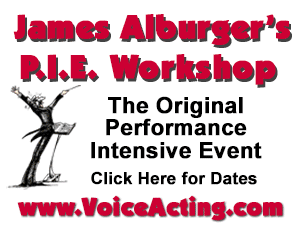|
Punctuation: How To Deal With It
... And Scripts With Bad Grammar
By Marc Cashman
Cashman Commercials
© 2008 Cashman Commercials
 Q: I’m a working voice actor who’s read hundreds of scripts, and I’ve noticed that copywriters are very inconsistent and confusing with punctuation. Q: I’m a working voice actor who’s read hundreds of scripts, and I’ve noticed that copywriters are very inconsistent and confusing with punctuation. Some scripts have words that are all capitalized. Others have directions inserted in the copy. Some scripts seem to have virtually no punctuation, and others have punctuation marks that make no sense. Then, of course, there is the constant, embarrassing misspellings of words or incorrect grammar.
Should I change the grammar in these scripts when I audition, or will that piss off the writer? Should I change the punctuation if it doesn’t make any sense?
A: You’ve hit on one of my pet peeves. Copywriters are notoriously bad spellers and grammarians. But take into account that when you’re reading ad copy, you’re reading “advertising-ese,” where proper grammar has been, to the consternation of English teachers around the world, thrown out the window.
This “ad-speak” is full of incomplete sentences, even in print!
But also understand that advertising copy is a horse of a different color, and sometimes should be read as poetry - free form, creatively, open to interpretation.
FIX GRAMMAR?
When my students ask me what to do when they encounter bad grammar, I answer: change it, unless it’s written specifically for a character. For instance, a Western or Southern character saying “ain’t” is perfectly acceptable, as are a lot of other grammatical “faux pas,” because they make sense - the writer deliberately wrote it that way.
But if the grammatical error is truly an error, a mistake, change it. Make sure you’ve made the correct change, though.
Believe me, your audition won’t get thrown out because you’ve altered the copy slightly. In fact, the writer will probably hear your suggested word change and incorporate it into a revised script.
PUNCTUATION POINTS
As far as punctuation is concerned, there are certain marks that should be honored and others that are more fluid.
Exclamation marks should always be honored. They’re at the end of a sentence for a reason - they’re not there by mistake. The writer is telling you: “I want excitement on this sentence!” It’s your job to discern how much excitement you need to give it.
You also need to honor the question mark. Again, it’s not there by mistake. But there are a hundred different ways to ask a question. Here again, you have to decide the appropriate way to ask it.
Semi-colons and dashes need to be honored. These are timing marks, and you have to figure out whether they translate into a beat, a mini-beat or a micro-beat. Some writers go so far as to write “Beat” in parentheses, to give you a timing cue.
Ellipses are quirky, and copywriters aren’t sure how to use them. Some use them as pauses, others use them as unfinished thoughts or sentences. Still others use them to tie lines together in a dialogue, where one person is finishing the sentence of the other, or interrupting them.
Parentheses should be read as asides, slightly sotto voce.
Quotation marks should be read with a micro-beat before and after the quoted word, unless it’s an actual quotation. I tell my students to treat quotation marks as they advertised the Playtex Living bra years ago - lift and separate.
COPYWRITER'S CUE
The easiest punctuation marks to figure out are the most obvious: those words that are underlined, in bold, capitalized or italicized.
That’s the copywriter’s cue to you to emphasize those specific words. Don’t ignore these applications to the copy. If you miss them, the writer or producer will think that you didn’t catch them, and they’ll determine that you’re not a very good reader/actor.
Periods and commas are more fluid. Sometimes you need to honor periods at the end of declarative sentences, sometimes not, depending on the copy.
The same goes for commas. You can use them to separate things, pause at certain places, or not at all.
The bottom line: make the copy make sense to you, to your cadence, to help you make the points you’re trying to make. If it means adding or removing a punctuation mark, do it.
NOT ALWAYS ...
I want to add a caveat: Don’t be changing things “whole cloth.” And realize that there are very few places where you can make these changes without getting into trouble.
Stage, TV and film scripts are fairly inviolate, unless you’re given permission to change a few things around. Radio is one of the few areas where you can make minor changes and not be given your walking papers.
Trust me, when you change a script just slightly to make it better, to make it make sense, you’ll be contributing something that makes you look good and enhances the copy.
Marc Cashman creates and produces copy and music advertising for radio and television. Winner of over 150 advertising awards, he also instructs voice acting of all levels through his classes, The Cashman Cache of Voice-Acting Techniques in Los Angeles, CA, and is now also offering one-on-one coaching via email or phone.
Email: cashcomm@earthlink.net
|
Tell Us What YOU Think!
Please Note: Since we check for spam, there will be a slight delay in the actual posting of your comment.
Comments
No comments have been posted yet. Hurry, and you could be the first!









click for new article alerts